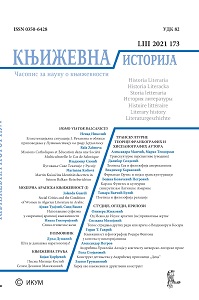Слика египатске жене у романима Тахе Хусеина
The Image of Egyptian Women in Taha Hussein’s Novels
Author(s): Ivana GligorijevićSubject(s): Other Language Literature
Published by: Институт за књижевност и уметност
Keywords: Feminism;Taha Hussein (Ṭāhā Ḥusayn);Arabic Novel;Arabic Cultural Reinnasance (al-nahḍa);
Summary/Abstract: The paper analyzes Taha Hussein’s (Ṭāhā Ḥusayn, 1889–1973) novels, which all belong to the engaged literature of the Arab cultural renaissance (al-nahḍa). His novels reveal the psychology of the people in the Egyptian provinces in the late 19th and early 20th century, while calling for social, intellectual and religious reform. Our analysis was focused on Hussein’s female characters and their sociocultural status. Taha Hussein was surprisingly interested in women’s lives. Speaking through his female characters, Hussein expresses his feminist views, criticizes the attitude of the conservative Egyptian society towards women, and emphasizes the importance of education in their further emancipation. Along with his well-known autobiography The Days (al-Ayyām, Vol. 1, 1929; Vol. 2, 1939; Vol. 3, 1967), we have analyzed those of his novels that depict Egyptian life: The Call of the Curlew (Duʻā’ al-karawān, 1934), A Man of Letters (Adīb, 1935), The Tree of Misery (Šağara al-bu’s, 1944) and his newly re-discovered novel, The Sheikh’s Proposal (2017), which has thusfar been poorly studied. In Hussein’s well-known autobiography, The Days, and his semi-autobiographical novel, A Man of Letters, there are only some sparse and haphazard mentions of Egyptian women’s life and their sociocultural status. However, we found these two works worthy of analysis, as they enable us to better understand the women’s role in the Egyptian social and cultural milieu. The rest of Hussein’s novels is of feminist significance par excellence, as it is most interested in the lives of women, to whom Taha Hussein has been very sympathetic. The Call of the Curlew is is a poetic and romantic story about a broad-minded girl who revolts against the practice of murdering women for having premarital sex. The Tree of Misery deals with both men and women, but it seems that its compassion is primarily reserved for the misery of its female characters, who are subject to arranged marriages and polygamy, while their lives highly depend on male family members and religious authorities. The Sheikh’s Proposal addressed a woman’s right to education, freedom of thought, life and marriage. Hussein’s non-Egyptian novels are also mentioned, as they put emphasis on female characters as well.
Journal: Књижевна историја
- Issue Year: 53/2021
- Issue No: 173
- Page Range: 127-141
- Page Count: 15
- Language: Serbian

